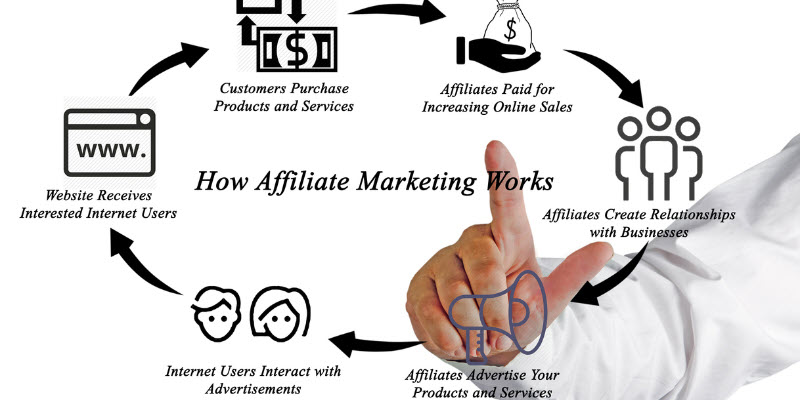How to Start Affiliate Marketing for Free
Affiliate marketing is an excellent way to earn passive income online by promoting products or services and earning a commission for every sale you generate. Many individuals are interested in starting affiliate marketing but often worry about the associated costs. In this comprehensive guide, we will show you how to start affiliate marketing for free. From finding the right niche to promoting products effectively, we will cover all the essential steps to help you embark on your affiliate marketing journey without breaking the bank.
Choosing a Profitable Niche
Selecting the right niche is crucial for your affiliate marketing success. To start, think about your interests, knowledge, and passion. Finding a niche that aligns with your expertise will make it easier for you to create engaging content and connect with your target audience. Additionally, consider the profitability of the niche and the availability of affiliate programs. You can research popular niches using tools like Google Trends or explore affiliate networks like Amazon Associates, ClickBank, or ShareASale for potential product categories.
Researching Affiliate Programs
Once you have chosen a niche, it’s time to research affiliate programs. Look for programs that offer attractive commission rates, quality products or services, and reliable tracking systems. Research the reputation and credibility of the affiliate programs by reading reviews and checking their performance on reputable affiliate marketing forums. It’s important to choose programs that align with your niche and resonate with your target audience.
Building a Website or Blog
Having a website or blog is essential for affiliate marketing as it provides a platform to showcase your content, engage with your audience, and promote affiliate products. Fortunately, you can create a website or blog for free using platforms like WordPress.com, Wix, or Blogger. Choose a user-friendly and customizable template that reflects the tone and style of your niche. Ensure that your website is visually appealing, easy to navigate, and mobile responsive for a seamless user experience.
Creating High-Quality Content
Content is king in affiliate marketing. It’s crucial to create high-quality, informative, and engaging content that adds value to your audience. Start by conducting keyword research to identify popular topics and search terms related to your niche. Incorporate these keywords naturally into your content to enhance your website’s visibility in search engine results. Additionally, use various content formats such as articles, tutorials, product reviews, and videos to cater to different preferences and increase engagement.
Driving Targeted Traffic
To generate affiliate sales, you need to drive targeted traffic to your website or blog. One effective strategy is to optimize your content for search engines. Implement on-page SEO techniques like optimizing meta tags, headers, and URLs. Create compelling meta descriptions that entice users to click on your website in search results. Additionally, build backlinks from reputable websites to increase your website’s authority and improve its search engine ranking.
Building an Email List
Building an email list is an excellent way to nurture relationships with your audience and promote affiliate products effectively. Offer valuable incentives, such as exclusive content or discounts, to encourage visitors to subscribe to your email list. Use email marketing tools like Mailchimp or ConvertKit to automate your email campaigns and send personalized, targeted messages to your subscribers. Remember to comply with relevant data protection regulations, such as the General Data Protection Regulation (GDPR).
Utilizing Social Media
Social media platforms provide a valuable opportunity to connect with your target audience and promote your affiliate products. Identify the social media channels that are popular among your target audience and create engaging profiles on those platforms. Share relevant content, interact with your followers, and participate in relevant communities or groups. Consider utilizing social media management tools like Hootsuite or Buffer to schedule and automate your social media posts.
Engaging with Your Audience
Engagement is crucial in affiliate marketing. Actively respond to comments, messages, and feedback from your audience to build trust and establish yourself as an authority in your niche. Encourage your audience to ask questions, provide suggestions, and share their experiences. Engaging with your audience not only strengthens your relationship but also helps you gather valuable insights to improve your content and promotional strategies.
Optimizing Conversion Rates
Converting your website visitors into customers is the ultimate goal of affiliate marketing. To optimize your conversion rates, strategically place affiliate links and banners within your content. Ensure that your affiliate promotions are relevant, genuine, and aligned with your audience’s interests. Use persuasive call-to-action statements that encourage visitors to take action. Testing different placements, formats, and designs can help you identify the most effective strategies to boost your conversion rates.
Tracking and Analyzing Results
To measure the success of your affiliate marketing efforts, it’s essential to track and analyze your results. Utilize web analytics tools like Google Analytics or Clicky to monitor your website’s performance, including traffic sources, user behavior, and conversion rates. Pay attention to the performance of individual affiliate products or campaigns to identify the most lucrative opportunities. Use this data-driven insight to make informed decisions and continually optimize your affiliate marketing strategy.
Leveraging SEO Techniques
Search engine optimization (SEO) plays a vital role in driving organic traffic to your website. Research relevant keywords for your niche and strategically incorporate them into your content, headings, and meta tags. Provide valuable information that addresses the needs of your target audience and encourages them to stay on your website. Utilize internal linking to guide users to related content within your website. Remember to create descriptive alt tags for images to improve accessibility and enhance SEO.
Utilizing Video Marketing
Video marketing has become increasingly popular and can be a powerful tool in your affiliate marketing arsenal. Create engaging videos that showcase product demonstrations, tutorials, or reviews. Leverage popular video platforms like YouTube or Vimeo to reach a wider audience. Optimize your video titles, descriptions, and tags using relevant keywords to enhance visibility in search results. Encourage viewers to visit your website or blog for more information and include affiliate links in the video description.
Maximizing Mobile Responsiveness
With the increasing use of mobile devices, optimizing your website for mobile responsiveness is crucial. Ensure that your website layout, images, and content adapt seamlessly to different screen sizes. Utilize responsive design principles to provide a user-friendly experience for mobile users. Slow-loading websites can deter visitors, so optimize your website’s loading speed by compressing images and minimizing scripts or plugins. Test your website on different mobile devices to ensure optimal performance.
Exploring Influencer Marketing
Influencer marketing can be an effective strategy to reach a wider audience and build credibility for your affiliate products. Identify influencers in your niche with a substantial following and engaged audience. Collaborate with them to promote your affiliate products through sponsored content, guest posts, or product reviews. This can significantly increase brand visibility and drive targeted traffic to your website. Ensure that the influencers you choose align with your brand values and have genuine influence over their audience.
Creating Engaging Product Reviews
Product reviews are a popular form of content in affiliate marketing, as they provide valuable insights to potential buyers. Write detailed and unbiased reviews of the affiliate products you promote, highlighting their features, benefits, and potential drawbacks. Include personal experiences and real-life examples to make your reviews more relatable and trustworthy. Use formatting techniques like bullet points or tables to present information concisely and make it easily scannable for readers.
Collaborating with Other Affiliates
Collaborating with other affiliates can be mutually beneficial and help expand your reach in the affiliate marketing industry. Identify affiliates who operate in complementary niches and share a similar target audience. Explore opportunities for cross-promotion, joint ventures, or affiliate partnerships. For example, you could contribute guest posts to each other’s websites or collaborate on a webinar or podcast. By leveraging each other’s networks, you can reach a broader audience and increase your affiliate sales potential.
Promoting Limited-Time Offers
Creating a sense of urgency can be an effective strategy to drive conversions and boost affiliate sales. Promote limited-time offers or exclusive discounts to your audience. Highlight the scarcity of the offer and emphasize the potential benefits or savings. Use attention-grabbing phrases like “limited time only” or “limited stock available” to create a sense of urgency. Ensure that the offers you promote align with your audience’s needs and preferences.
Participating in Affiliate Contests
Many affiliate programs and networks organize contests to incentivize affiliates and reward their top performers. Participating in these contests can provide additional motivation and increase your chances of earning higher commissions. Monitor affiliate networks or contact affiliate managers to stay updated on ongoing contests. Allocate dedicated time and effort to promote the contest-related products or campaigns. Remember to read the contest rules carefully and comply with the terms and conditions to qualify for prizes.
Offering Exclusive Discounts
Exclusive discounts are an effective way to entice your audience and drive affiliate sales. Negotiate with affiliate program managers to secure exclusive discount codes for your audience. Promote these discounts prominently on your website, blog, or social media platforms. Highlight the benefits of the discounted products and emphasize the savings your audience can enjoy. Encourage your audience to take advantage of these limited-time discounts and include affiliate links alongside the discount codes.
Diversifying Your Affiliate Channels
Relying solely on one affiliate channel can limit your earning potential. Diversify your affiliate channels by exploring different networks, platforms, or promotional strategies. Consider promoting affiliate products through email marketing, social media marketing, content marketing, or paid advertising. Experiment with different channels and evaluate their performance to identify the most effective ones for your niche. By diversifying your channels, you can reach a wider audience and increase your chances of generating more affiliate sales.
Staying Up to Date with Industry Trends
The affiliate marketing landscape is constantly evolving, and staying up to date with industry trends is essential for your success. Follow industry-leading websites, blogs, and influencers to stay informed about the latest strategies, tools, and technologies. Join affiliate marketing forums or communities to connect with fellow marketers and learn from their experiences. Continuously educate yourself and adapt your strategies to the changing dynamics of the affiliate marketing industry.
Overcoming Challenges
While starting affiliate marketing for free is possible, it’s important to acknowledge and prepare for the challenges you may face. Building a solid foundation takes time and effort. You may encounter obstacles like competition, limited initial traffic, or rejection from affiliate programs. However, persistence, continuous learning, and adapting your strategies will help you overcome these challenges. Stay focused, remain dedicated, and embrace the journey as you work towards building a successful affiliate marketing business.
FAQs
Q: How long does it take to see results in affiliate marketing?
A: The timeframe for seeing results in affiliate marketing varies based on various factors, including your niche, marketing strategies, and consistency. It’s important to set realistic expectations and understand that building a successful affiliate marketing business takes time. Some marketers start seeing initial results within a few months, while others may take longer. Stay consistent, monitor your progress, and make necessary adjustments to optimize your results.
Q: Is it possible to start affiliate marketing without a website?
A: While having a website is highly recommended for affiliate marketing, it is possible to start without one. You can leverage social media platforms, email marketing, or other channels to promote affiliate products. However, having a website provides you with a centralized platform to showcase your content, engage with your audience, and build a brand. It also offers more flexibility and control over your marketing efforts.
Q: How much money can I make from affiliate marketing?
A: The potential earnings in affiliate marketing can vary greatly and depend on factors such as your niche, marketing strategies, target audience, and the products or services you promote. Some affiliates earn a modest side income, while others achieve substantial six-figure or even seven-figure incomes. The key to success lies in finding the right niche, building a loyal audience, and implementing effective marketing strategies.
Q: Do I need to be an expert in the niche I choose for affiliate marketing?
A: While being an expert in your chosen niche can certainly be advantageous, it is not always a requirement. With thorough research and dedication, you can gain the necessary knowledge and become a valuable resource for your audience. Focus on continuous learning, staying updated with industry trends, and providing valuable information that helps your audience make informed purchasing decisions.
Q: Are there any costs involved in affiliate marketing?
A: While it’s possible to start affiliate marketing for free, there may be some associated costs depending on your approach. These costs can include domain registration, web hosting, email marketing tools, advertising expenses, and optional investments in training or resources. It’s important to budget and plan accordingly, especially as your affiliate marketing business grows.
Q: Can I do affiliate marketing alongside my full-time job?
A: Yes, affiliate marketing offers the flexibility to be pursued alongside a full-time job. Many successful affiliate marketers started part-time and gradually transitioned to full-time as their income grew. It requires effective time management, consistency, and dedication to balance both responsibilities. As you gain experience and your affiliate marketing income increases, you can assess the feasibility of transitioning to full-time affiliate marketing.
Conclusion
Starting affiliate marketing for free is an achievable goal with the right strategies and mindset. By selecting a niche, creating valuable content, driving targeted traffic, and optimizing your conversion rates, you can build a successful affiliate marketing business. Stay committed, adapt to industry trends, and continuously educate yourself to maximize your earning potential. Remember, success in affiliate marketing is a journey that requires patience, persistence, and ongoing effort.
To Our Unlimited Success!

P.S. Want to make money online? Click here to get my 100% Free Course and learn How ANYONE Can Launch the #1 Beginner Friendly Online Business from Home!!
P.P.S If you found value on my website, your support is greatly appreciated, feel free to buy me a coffee by clicking here!






